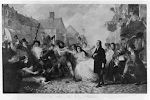Our second question that all preachers should ask stems from the belief that all good preaching has Scripture as its fount. Scripture is special in regards to its content, authority and voice. There are several basic problems preachers consistently make regarding Scripture, and for these mistakes they shall be written up in our quaint blog.
1. Not paying any attention to the passage/Using Scripture as a springboard to say what you were dying to say anyway. This is way too common, and probably does not need much explanation. We assume that many of you have sat through sermons that began with a passage from John, and that was the last time anything resembling Scripture was mentioned.
2. Acting as though the most faithful reading of the passage is word by word, line by line, or verse by verse. This tends to happen in churches that claim to really value Scripture and is often referred to as biblical preaching. The idea seems to be that if one really values and loves Scripture, one will take it seriously enough to care about every word, and that this form of preaching will prevent us from making the terrible mistake associated with error 1 above. This form of preaching is flawed in that at its core it misses the beauty and quality of Scripture. Big ideas, story lines, and themes in the books of the Bible (and the Bible itself for that matter) are lost. The dots are left unconnected. In place of connecting the dots, error number 3 most often occurs.
3. Believing that the role of Scripture is to produce principles and nuggets of truth. In our experience this error is equally prevalent in liberal and conservative (if those labels are even remotely helpful) churches. Ironically, the principles seem to be different in each place, but the methodology is remarkably consistent. Not the least of our problems with this model of preaching is that it is so freaking easy to do. If you are going to preach a bad sermon, at least put some effort into it, otherwise how would we feel guilty about making fun of you.
With those key errors (that list is by no means comprehensive) delineated some of you may be asking, “Badpreaching.blogspot.com, what is good way to preach with Scripture?” Despite your poor grammar, we will answer your question, and fortunately for you we have come up with three helpful guidelines (that’s right, three points), all of which begin the same letter (for ease of memory and because it’s awesome).
Story telling: Tell the story of Scripture repeatedly, keep us abreast of the flow of the book, and how that flow fits into the larger stream of Scripture as a whole.
Set the tone: Feel free to be creative in your preaching, by modeling for us the tone of the text. If Paul is making an argument about adding to the gospel and the dangers of following another way, make that real for your congregation, not just mentally, but emotionally as well.
Study the Scriptures: Model for us a way of reading the Bible. Don’t preach in a way that doesn’t help your congregates (I don’t not love double negatives) read their Bibles elsewhere.
That should be enough help to get you started. If you are still unclear on any points, stick around and we’ll pick out all the flaws for your edification.














